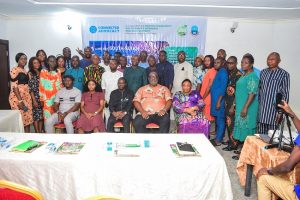The city of Yenagoa in Bayelsa State on Thursday, August 29, 2024, played host to the South-South Regional Summit on Accelerating Nigeria’s Emission Reduction (Net-Zero) Commitment for Local Government authoring organised by Connected Advocacy in collaboration with Institute of Biodiversity, Climate Change and Watersheds Niger Delta University.

The central theme was on strengthening collaboration for just transition implementation and improve energy access at the subnational level.
The event was opened by the Vice Chancellor of the Niger Delta University who was represented by the Director of Institute of Biodiversity, Climate Change Watersheds, Dr Cyprian Abasi, who welcomed the Chairmen, heads of LGA Administration, and LGA leaders of legislative Council.
He said: “Accelerating implementation for sub-national government to achieve Nigeria’s net-zero commitment to tackle climate change and improve energy access and subnational development is a commitment for everyone to work together to build a lasting legacy that our people and planet will be proud of.”
He further stressed the time essence to act which is now and warned of the devastating consequences of inaction to climate change mitigation and adaptation considering pressing issue of its impact in communities. He encouraged participants to use the summit to build bridges and foster collaboration and champion contributions towards achieving Nigeria’s net-zero target.
The convener and Executive Director of Connected Advocacy, Prince Israel Orekha, underlined the need to develop local government climate action plans, adding that it is required to drive funding and sustainable environmental development.
GodsonJim-Dorgu Mac-Jim Foundation and its team members spoke on the Need for Just Transition and Environmental Sustainability, saying that Nigeria’s heavy reliance on fossil fuels contributes to significant greenhouse gas emissions, air pollution, and environmental degradation.
The need for the country to fulfill its policy work commitments under the Paris Agreement and its Nationally Determined Contributions (NDCs) require a shift towards cleaner energy sources, they added.
They emphasised that urgent action should be given to energy security and access, adding: “We need to stop overdependence on imported petroleum products and lack of diversification in the energy mix will make Nigeria vulnerable to global price fluctuations and supply disruptions, this we are currently suffering now.
“Improving energy access, particularly in underserved rural areas, is crucial for socioeconomic development and poverty alleviation.”
Mrs. Allen Alice Tangi, Chairman, Sagbama Local Government, thanked the organisers and pledged to implement learning and resolutions from the summit.
“The summit has opened our eyes to the urgent need for action. We pledge to work together to address the challenges of climate change,” she said.
Bulodisiye Ndiware, Chairman, Yenagoa Local Government Council, said: “The time for talk is over. We must take concrete steps to mitigate the effects of climate change.”
David Alagoa, Chairman, Nembe Local Government, said: “I would like to thank the organisers of this programme for the issues around climate change cannot be overemphasised because it affects us all, and it will be an avenue to start working on the change that we need as a people and as a community. We need to get organised using data gathering to drive real action on the ground.
Participants listed next steps to include:
- Development of a comprehensive action plan to address climate change.
- Conducting an emission inventory to identify areas for reduction.
- Implementation of emission reduction strategies and data for development.
- Execution of strategies for sustainable development.
- Monitoring and reporting progress.
